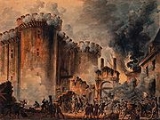
social and political upheaval in France
and Europe
. The absolute monarchy
that had ruled France for centuries collapsed in three years. French society underwent an epic transformation as feudal
, aristocratic and religious privileges evaporated under a sustained assault from radical
left-wing political groups, masses on the streets
, and peasants in the countryside.
987 Hugh Capet is crowned King of France, the first of the Capetian dynasty that would rule France till the French Revolution in 1792.
1786 French Revolution: The Assembly of Notables is convened.
1789 French Revolution: citizens of Paris storm the Bastille and free seven prisoners.
1789 French Revolution: Women of Paris march to Versailles in the March on Versailles to confront Louis XVI about his refusal to promulgate the decrees on the abolition of feudalism, demand bread, and have the King and his court moved to Paris.
1789 French Revolution: Louis XVI returns to Paris from Versailles after being confronted by the Parisian women on 5 October
1790 French Revolution: the Revolutionary Tribunal is suppressed.
1790 Edmund Burke publishes ''Reflections on the Revolution in France'', in which he predicts that the French Revolution will end in a disaster.
1790 Louis XVI of France gives his public assent to Civil Constitution of the Clergy during the French Revolution.
1791 Members of the French National Guard under the command of General Lafayette open fire on a crowd of radical Jacobins at the Champ de Mars, Paris, during the French Revolution, killing as many as 50 people.
1792 French Revolution: French Revolution: French Revolution: [[10 August (French Revolution)|Storming of the Tuileries Palace

